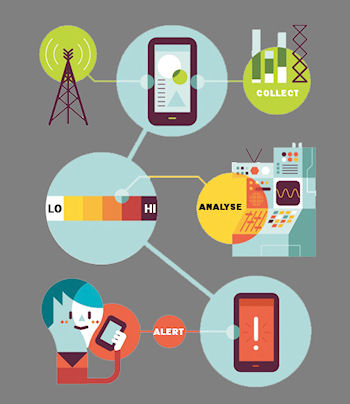Start-Up Uses Radiation Detection To Improve Mobile Phone Coverage

Cellphone radiation has not been proved to be harmful but its presence can be used to improve reception
Tawkon, an Israeli start-up currently residing at The Time incubator in Tel Aviv, has developed a free software technology aimed at consumers and designed to detect “non-ionising radiation” produced by smartphones, the same radiation that some researchers claim can cause brain cancer.
While not everyone is convinced that long exposure to a mobile device can actually harm people, the company has built a business on the data collected from measuring radiation emissions. Tawkon was chosen by Wired as one of Europe’s 100 hot start-ups, and the app is available on Android and Blackberry.
Apple famously refused to host the software on its platform, presumably because it would suggest that its products are “unhealthy”.
Everybody wins
According to Tawkon, the World Health Organisation classes high intensity non-ionising radiation as a possible carcinogen. There is an opinion that high intensity radiation produced by mobile phones can damage living cells over time.
Last year, the Daily Mail reported that the Children with Cancer conference called for more research into potential brain cancer risks in mobile phone users, after seeing an increase in number of tumours. However, a later study from the Health Protection Agency suggested that the only confirmed danger to mobile phone user’s health was from using the device while driving.
“It is important for me to say that science is not yet conclusive about the mobile impact of mobile radiation,” said Gil Friedlander, co-founder and CEO of Tawkon. That didn’t prevent him from creating an app to help users to avoid exposure.
Peak activity
Tawkon found out that 90 percent of the time the radiation that a phone emits is really low. One of the main factors responsible for this is reception. For the remaining ten percent of the time, the phone emits around 300 times more “bad mojo”. The app monitors the levels of radiation and warns the users of an increase, so they can switch to a speakerphone or a headset. A short vibration tells the health-conscious individual to get the device away from his head.
Friedlander says that sometimes radiation emissions will be higher in one corner of the room but not the other, so the app can suggest a change in daily routine. Parents can even check how long their offspring have been subjected to the harmful influence of a smartphone.
Thanks to this data, Tawkon can find out the areas where most calls were dropped, or where the coverage is patchy. According to Tawkon, the 3G network coverage in the UK is pretty bad, despite a high number of base stations. One explanation says that the thick Victorian walls of houses block the signal. Since around 70 percent of mobile calls are taken indoors, it drags the overall reception down. Additionally, a phone must work harder to connect to a base station in the rain.
You can argue with Tawkon’s scientific basis, but its free service keeps wary mobile phone users feeling safer and may help the rest of us to become better connected.